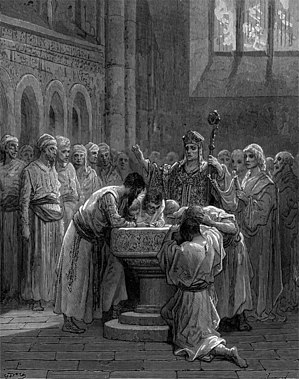
Back كافر Arabic Vantro Danish Unglaube German Άπιστος Greek Nekredanto Esperanto Infiel Spanish Uskmatu Estonian Mécréant French ഇൻഫിഡെൽ Malayalam Ongelovige Dutch

An infidel (literally "unfaithful") is a person who is accused of disbelief in the central tenets of one's own religion, such as members of another religion, or irreligious people.[1][2]
Infidel is an ecclesiastical term in Christianity around which the Church developed a body of theology that deals with the concept of infidelity, which makes a clear differentiation between those who were baptized and followed the teachings of the Church versus those who are outside the faith.[3] Christians used the term infidel to describe those perceived as the enemies of Christianity.
After the ancient world, the concept of otherness, an exclusionary notion of the outside by societies with more or less coherent cultural boundaries, became associated with the development of the monotheistic and prophetic religions of Judaism, Christianity, and Islam (cf. pagan).[3]
In modern literature, the term infidel includes in its scope atheists,[4][5][6] polytheists,[7] animists,[8] heathens, and pagans.[9]
A willingness to identify other religious people as infidels corresponds to a preference for orthodoxy over pluralism.[10]
- ^ See:
- James Ginther (2009), The Westminster Handbook to Medieval Theology, Westminster, ISBN 978-0664223977, Quote = "Infidel literally means unfaithful";
- "Infidel", The American Heritage Dictionary of the English Language, Fourth Edition, Houghton Mifflin Company. "An unbeliever with respect to a particular religion, especially Christianity or Islam";
- Infidel, Oxford Dictionaries, US (2011); Quote = "A person who does not believe in religion or who adheres to a religion other than one’s own"
- ^ "infidel". The Oxford Pocket Dictionary of Current English. Oxford University Press. 2009. Retrieved 20 June 2010.
a person who does not believe in religion or who adheres to a religion other than one's own.
- ^ a b ""Infidels." International Encyclopedia of the Social Sciences. 2008". MacMillan Library Reference. Retrieved 20 June 2010.
- ^ The Works of Thomas Jackson, Volume IV. Oxford University Press. 1844. p. 5. Retrieved 8 April 2011.
Atheism and irreligion are diseases so much more dangerous than infidelity or idolatry, as infidelity than heresy. Every heretic is in part an infidel, but every infidel is not in whole or part an heretic; every atheist is an infidel, so is not every infidel an atheist.
- ^ The Bengal Annual. Samuel Smith and Co. 1830. p. 209. Retrieved 8 April 2011.
Kafir means an infidel, but more properly an atheist.
- ^ Catechism of the Catholic Church. Burns & Oates. 23 June 2002. ISBN 9780860123248. Retrieved 8 April 2011.
2123 'Many... of our contemporaries either do not at all perceive, or explicitly reject, this intimate and vital bond of man to God. Atheism must therefore be regarded as one of the most serious problems of our time.' 2125 Since it rejects or deniest the existence of God, atheism is a sin against the virtue of religion.
- ^ See:
- Ken Ward (2008), in Expressing Islam: Religious Life and Politics in Indonesia, Editors: Greg Fealy, Sally White, ISBN 978-9812308511, Chapter 12;
- Alexander Ignatenko, Words and Deeds, Russia in Global Affairs, Vol. 7, No. 2, April–June 2009, p. 145
- ^ Whitlark & Aycock (Editors) (1992), The literature of emigration and exile, Texas Tech University Press, ISBN 978-0896722637, pp. 3–28
- ^ See:
- Tibi, Bassam (2007). Political Islam, World Politics and Europe. Taylor & Francis. p. 47. ISBN 978-0415437806.
- Mignolo W. (2000), The many faces of cosmopolis: Border thinking and critical cosmopolitanism. Public Culture, 12(3), pp. 721–48
- ^ See:
- Cole & Hammond (1974), Religious pluralism, legal development, and societal complexity: rudimentary forms of civil religion, Journal for the Scientific Study of Religion, Vol. 13, No. 2, pp. 177–89;
- Sullivan K. M. (1992), Religion and liberal democracy, The University of Chicago Law Review, Vol. 59, No. 1, pp. 195–223.